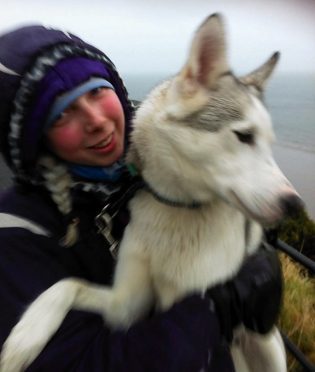A Czech man accused of murdering Scot Rebecca Johnson has admitted he killed her, but denied murder, claiming he has no memory of the frenzied attack.
In a courtroom in Finnish Lapland, the Johnson family listened to details of Rebecca’s death in December last year at a husky farm in a remote wilderness region.
Her parents, brother and sister all wore purple ribbons to highlight the issues of domestic violence. State prosecutor Juhani Mäki says Rebecca, from Fife, was stabbed 10 times in the torso, and sustained 30 more cuts to her head, chest, stomach, arms and leg.
There was evidence of defensive wounds to her hands too, the court heard.
Speaking for the first time about Rebecca’s death, Karel Frybl says he “lived in denial” for months after the incident.
With a slight Scottish accent, picked up from his time working at a slaughterhouse, Frybl cried as he said he hadn’t wanted to admit she was gone.
“I spent half a year in prison. Stubbornly, I didn’t want to accept it until I saw the pictures” (of the crime scene during the investigation process).
The couple had argued in the days and weeks before her death, and had evidently decided to call time on their three-year relationship the night before the attack.
The relationship had been peppered with verbal and physical abuse, and WhatsApp messages read to the court from Rebecca’s sister Victoria showed the family was worried about her safety.
Victoria urged her sister to report Frybl’s behaviour to their employer, Santa Safari, and wrote “he is a danger . . . this will escalate and he may end up killing you”.
In court, Frybl claims that during their final argument early on the morning of December 3, Rebecca hit him, and then he felt a pain in his chest where she stabbed him.
However, prosecutors presented medical and forensic evidence to show that Frybl stabbed himself only hours later. Whether or not the panel of three judges believes Frybl’s story that Rebecca attacked him first, could be the difference between a conviction for manslaughter, or murder, which carries a minimum of 12 years in prison.
Frybl’s lawyer claims his time as a soldier in Kosovo and Afghanistan may have impacted on his mental health, and played a role in the alleged memory loss.
The accused cried as he described being in a trance-like state during that time.
“I could still see the knife in my hand. I knelt down next to Becky and I shook her shoulder.”
Frybl fled the scene with his husky dogs, and when police caught up with him hours later he was suffering from hypothermia, and bloody from the cuts to his chest.
The trial continues today.
